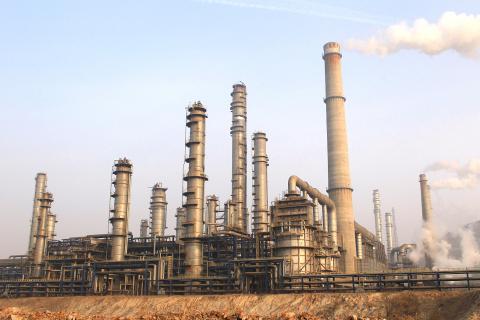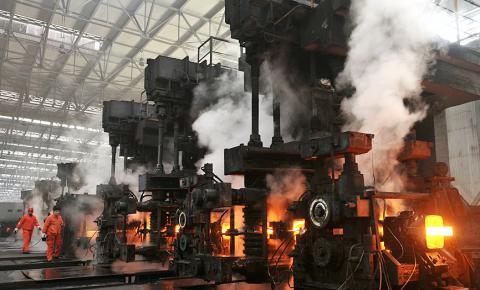Clouds of smoke billow from the chimneys at a Chinese chemical plant rumbling with activity, more than a year after authorities closed it following protests by thousands of people.
The factory in Dalian, Liaoning Province, was ordered to halt work and relocate 17 months ago after local residents took to the streets, fearing a toxic chemical spill that might poison them and their children.
However, it appears to be functioning now, although at what capacity is unclear.

Photo: AFP
The apparent U-turn raises questions about how the Chinese Communist Party, ever fearful of social unrest, can deal with the country’s pollution problem while also retaining the manufacturing operations that have powered economic growth.
Across China, public frustration mounted this week as dense smog blanketed swathes of the country, with even state-run media questioning the authorities’ ability to meet their goal of building a “beautiful China.”
The darkened skies prompted Chinese Vice Premier and premier-elect Li Keqiang (李克強) to call for stricter enforcement of environmental protections — but failing to fulfil even simpler promises such as shutting the plant in Dalian could further prime popular anger.

Photo: Reuters
“They have no intention of moving,” regardless of company and government promises, said a local resident surnamed Zhao (趙), 31, who said he worked near the plant until eight months ago.
“They have never even stopped operating,” he added, expressing a distrust in the local government echoed by other residents.
Zhao said he switched jobs to escape the “nose-stinging” stench in the area — an industrial zone with mammoth pipes and storage towers that churns out everything from ship parts to electricity.
“The smell there was too much. Working there long-term was not good for one’s health,” Zhao said, adding that he still suffers from a nagging cough.
About 12,000 people demonstrated in the center of the northeastern city in August 2011 after waves from an approaching storm breached the seaside plant’s protective dyke, forcing residents to be evacuated and raising fears of a toxic spill.
The factory produced paraxylene (PX), a flammable carcinogenic liquid used to make polyester films and fabrics.
Authorities pledged to shut the plant and move it to a remote location, while the company, Dalian Fujia Dahua Petrochemical (大連福佳大化石油化工), agreed to “immediately carry out work to stop the PX project,” the Dalian Daily newspaper reported at the time.
However, a local government official later told media that the factory had resumed operations after meeting certain standards.
Others reached by reporters declined to comment, saying only that relocation plans were in the works, while three company employees refused to confirm or deny whether production was continuing.
Tang Zailin, the head of a local environmental group, said his members were watching to see if authorities would eventually move the plant.
Tang urged them to take seriously a call by Chinese President Hu Jintao (胡錦濤) in a key speech in November last year to build a more “beautiful China.”
“’Beautiful’ has to include a nice environment, right?” he said.
Since July last year, mass protests in at least three cities — some with violent incidents — have forced industrial projects to be canceled. In Ningbo city, residents said they doubted authorities would keep their word.
In November last year, Chinese Minister of Environment Protection Zhou Shengxian (周生賢) promised that all major future projects would undergo “social impact assessments.”
Such studies might help avoid protest, environmental lawyer Wang Canfa (王燦發) said, but ultimately, factories should be opened or shut based on written codes rather than public duress — which could unfairly punish companies in compliance.
“The key is whether or not they meet the requirements of the law,” said Wang, who runs the Center for Legal Assistance to Pollution Victims, a legal aid center in Beijing. “This approach of promising to stop work and then restarting after people stop making a fuss, without giving the public any explanation or information — the biggest victim will be the government’s credibility.”
“The next time they say something, the people will not believe them,” Wang added.

IN THE AIR: While most companies said they were committed to North American operations, some added that production and costs would depend on the outcome of a US trade probe Leading local contract electronics makers Wistron Corp (緯創), Quanta Computer Inc (廣達), Inventec Corp (英業達) and Compal Electronics Inc (仁寶) are to maintain their North American expansion plans, despite Washington’s 20 percent tariff on Taiwanese goods. Wistron said it has long maintained a presence in the US, while distributing production across Taiwan, North America, Southeast Asia and Europe. The company is in talks with customers to align capacity with their site preferences, a company official told the Taipei Times by telephone on Friday. The company is still in talks with clients over who would bear the tariff costs, with the outcome pending further

A proposed 100 percent tariff on chip imports announced by US President Donald Trump could shift more of Taiwan’s semiconductor production overseas, a Taiwan Institute of Economic Research (TIER) researcher said yesterday. Trump’s tariff policy will accelerate the global semiconductor industry’s pace to establish roots in the US, leading to higher supply chain costs and ultimately raising prices of consumer electronics and creating uncertainty for future market demand, Arisa Liu (劉佩真) at the institute’s Taiwan Industry Economics Database said in a telephone interview. Trump’s move signals his intention to "restore the glory of the US semiconductor industry," Liu noted, saying that

NEGOTIATIONS: Semiconductors play an outsized role in Taiwan’s industrial and economic development and are a major driver of the Taiwan-US trade imbalance With US President Donald Trump threatening to impose tariffs on semiconductors, Taiwan is expected to face a significant challenge, as information and communications technology (ICT) products account for more than 70 percent of its exports to the US, Chung-Hua Institution for Economic Research (CIER, 中華經濟研究院) president Lien Hsien-ming (連賢明) said on Friday. Compared with other countries, semiconductors play a disproportionately large role in Taiwan’s industrial and economic development, Lien said. As the sixth-largest contributor to the US trade deficit, Taiwan recorded a US$73.9 billion trade surplus with the US last year — up from US$47.8 billion in 2023 — driven by strong

STILL UNCLEAR: Several aspects of the policy still need to be clarified, such as whether the exemptions would expand to related products, PwC Taiwan warned The TAIEX surged yesterday, led by gains in Taiwan Semiconductor Manufacturing Co (TSMC, 台積電), after US President Donald Trump announced a sweeping 100 percent tariff on imported semiconductors — while exempting companies operating or building plants in the US, which includes TSMC. The benchmark index jumped 556.41 points, or 2.37 percent, to close at 24,003.77, breaching the 24,000-point level and hitting its highest close this year, Taiwan Stock Exchange (TWSE) data showed. TSMC rose NT$55, or 4.89 percent, to close at a record NT$1,180, as the company is already investing heavily in a multibillion-dollar plant in Arizona that led investors to assume